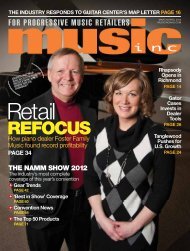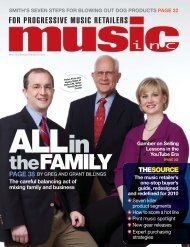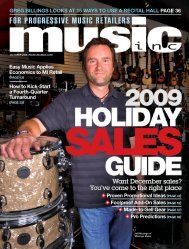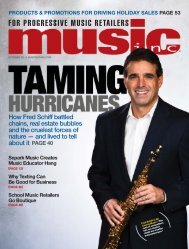Create successful ePaper yourself
Turn your PDF publications into a flip-book with our unique Google optimized e-Paper software.
THE GOSPEL<br />
OF RETAIL<br />
Chip Averwater adopted the persona<br />
of a southern preacher to<br />
spread the gospel of Retail Truths, his<br />
new book. During his session of the<br />
same name, the Amro <strong>Music</strong> chairman<br />
and former NAMM chairman<br />
shared 30 of these truths. Highlights:<br />
+ A company is known by the<br />
people it keeps. “A store is the product<br />
of the people it sells.”<br />
+ Love your products, but only<br />
for their sales. “We’re stocking a<br />
store, not a museum or a trophy case.”<br />
+ The measure of a manager is<br />
the situations he can handle amiably.<br />
“A good manager can deliver<br />
a difficult message with respect and<br />
consideration.”<br />
+ Volume feeds egos; profit feeds<br />
families.<br />
+ A manager is not a referee.<br />
“A manager cannot resolve disputes<br />
between employees.<br />
“The solution is we need to ask<br />
them to work it out. ‘It’s not good<br />
for the company for the two of you<br />
to be fighting.’”<br />
+ Happy customers come and<br />
go; unhappy customers accumulate.<br />
“It’s worthwhile to find them and make<br />
38 I MUSIC INC. I JULY 2012<br />
Chip Averwater<br />
‘Happy customers<br />
come and go;<br />
unhappy<br />
customers<br />
accumulate.’<br />
up with them. They can be as great an<br />
advocate as they are an adversary.”<br />
+ A good salesman makes a<br />
bad buyer. “They have too much<br />
empathy with other salespeople. Their<br />
personality is at odds with detail.<br />
“And why do we want to keep them<br />
from the sales floor?”<br />
+ An aggressive competitor deserves<br />
the bad deals. “A lot of sales<br />
don’t make sense. Let ’em go.<br />
“Sometimes, when we raise our<br />
prices, the competition does, too —<br />
eventually.”<br />
+ A retailer’s effectiveness can<br />
be measured by the animosity of<br />
his competitors. “There’s no good<br />
sportsmanship in retail.”<br />
+ If at first you do succeed,<br />
try not to believe you’re infallible.<br />
“We really need periodic failures to<br />
keep us realistic.”<br />
Maribeth<br />
Barrons<br />
MERCHANDISING<br />
NO NO’S<br />
During “What NOT to Display,” Hal<br />
Leonard’s Maribeth Barrons showed<br />
retailers how to “eliminate decades<br />
of display deficits,” as she put it. The<br />
humorous session outlined what she<br />
sees as three major mistakes dealers<br />
make in merchandising print music<br />
and how to correct these blunders.<br />
1. Don’t display that you have<br />
the lowest price. “Dot-coms with<br />
their low prices aren’t the end all and<br />
be all. Seventy-eight percent of consumers<br />
list information as the most<br />
significant purchasing factor. So don’t<br />
advertise that you have the lowest price.<br />
“And I’ve seen stores prohibit consumers<br />
from using their smartphones<br />
in-store. Don’t do that. That consumer<br />
is trying to make a buying decision.”<br />
2. Don’t display method books.<br />
“What the heck are you doing giving<br />
that kind of space to an item that’s<br />
already sold? Milk and eggs are not<br />
at the front of the grocery store.<br />
“Indeed, method books are already<br />
sold. You or a publisher already<br />
did the work to sell them.”<br />
3. Don’t use header cards to<br />
display print inventory. “Trust<br />
me, I want you to be able to have<br />
all that product in your store, and I<br />
want you to be able to sell it, too.<br />
“Add tiers to your displays to create<br />
more selling opportunities.”

















